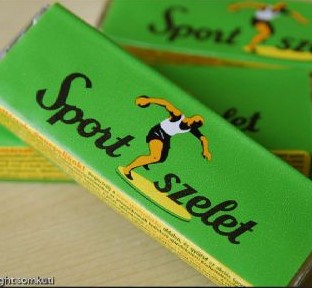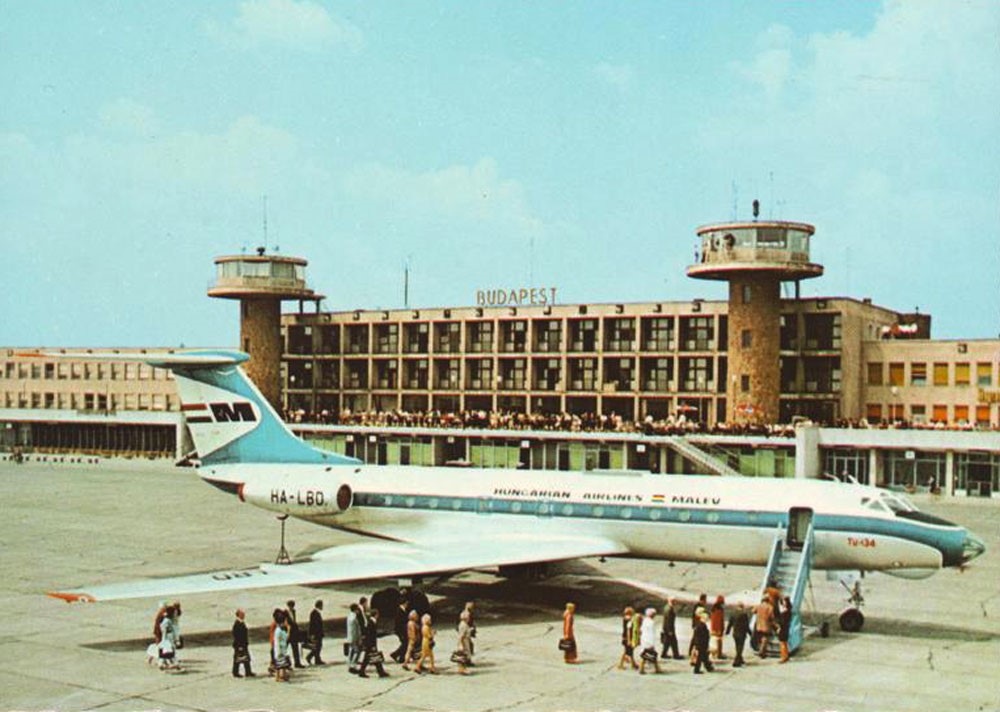by Robert Imre, Tampere Peace Research Institute, Tampere University, Finland
I love sportszelet. Always have. The slightly dry chocolate, with just a hint of rum flavour, and the off-normal rectangular size of 25 grams, always appealed to me, especially as a child. Being different to the chocolates that were around where I grew up in a suburb of Toronto, Canada, made it even more appealing; something unique. My earliest memory of the green label was eating the chocolates after some friends of my parents had returned to Toronto from a visit to Hungary. Being part of a friendship circle dominated by exiles from the 1956 Revolution, my parents had regular access to various products people had brought us from ‘home’. Many things from Hungary were familiar to me and others like me. But then I was also lucky enough to make my first trip to Hungary as a small child.

That trip to visit relatives of my parents was a proper Cold War border crossing in the early 1970s when I was about seven years old. The border crossing was ‘modern classical’ in that sense: strip search for me and my mother, diaper removal and search for my baby sister (I remember they actually tore apart the diaper she was wearing), random confiscation of goods we were carrying, nasty border guards relishing their power and looking at us with obvious and aggressive disdain, and spending what seemed like a very long time in the ‘family interrogation room’. I remember quite clearly the comments from the border guards, comments that were debriefed immediately among relatives during our trip to Hungary, as well as friends and relatives, back in the suburbs of Toronto. ‘Why are you bringing chocolate from Canada to Hungary? We have chocolate here’; ‘those kinds of diapers are bad for children. Don’t you know that?’; ‘Why are your children asking for water? Were they not treated well on the plane?’; ‘Your children look ill and malnourished. Hopefully your relatives will be able to feed them properly when they are here at home in Hungary.’ They took a couple of books from me and also my own chocolates I was carrying. No explanation was forthcoming. And of course at the end of the interrogation we were told ‘welcome home’. Not welcome to Hungary, but welcome home.

Once on the ‘other side’ much was familiar and much was not. Many of the tastes, as a very visceral memory, remain with me more than four decades later. Kifli (a crescent shaped dough bun), a particular kind of butter, a particular tomato variety, szalonna, kolbász, innumerable pastries, many other things. These were already built in to the catalogue of foods in my world in the suburbs of Toronto, but always subtly different, and as such a curiosity to explore. Obtaining and experiencing those items was a vastly different experience than in Canada, however, as conversations involving a dropped word in English would elicit scrutiny, sometimes to the level of a disguised ‘official person’ stopping us in a public place and asking for identification. It was not a question of whether or not various food items were available in Budapest, but rather the journey and strange kinds of human interactions required to obtain those items was the big difference. Wearing seemingly ‘western’ clothing meant that as a small child in Budapest in the 1970s I was an open target for comments that summer from anonymous elderly women, correcting behaviour, and openly telling me not to be so flügös (wacky). After all, children should never smile or laugh in public places. Wearing running shoes everywhere was a deeply suspicious form of behaviour and having no fear of ‘weather’, such as summer breezes sneaking through windows disguised as deadly drafts, or having wet hair. All signs of lack of discipline, but also in need of behavioural correction from strangers both official and non-official.

The chocolates often appeared through the movement of friends and relatives in the large network of Toronto-based ‘56ers’ and their families and acquaintances. The return voyage was without incident, no harassment from border guards once arriving in Canada, and no souvenirs taken away from us. We had some books from Hungary, wine, spirits, and some other things packed tightly in to all of our suitcases. We were not strip-searched at the Toronto airport, and got to keep all of the objects in our luggage as we were told ‘welcome to Canada’. We brought sportszelet with us, and I often peeled off the label of the chocolates and slowly enjoyed the rum-ish flavouring for the dark chocolate while reminiscing about the trip – how the chocolate was the same, but somehow the people were not. Whenever our travels were dissected by Hungarian friends and family, the inevitable conclusion was that the dramatic difference between the totalitarian state in which surveillance was so deeply ingrained that officials could do whatever they pleased, and random strangers were also charged with keeping social order, was doomed. Little did they suspect that we would all be closer to those systems today.
It is quite unfortunate that in a global sense we have all converged on this type of surveillance that is reminiscent of the Cold War, something that we were supposed to have rejected decades ago. I am lucky enough to still speak to some of those 56ers and their children and it is a topic that comes up regularly. The return to hard borders, reducing people to national stereotypes, and capacity of various officials to do whatever they want is seemingly reproduced globally. What was then seen as impossible in ‘the west’ is now everywhere being re-justified both in the physical presence of the policing authorities, as well as various digital surveillances of both state and corporations. Much of which we choose, just as the elderly ladies in the grocery store in the early 1970s in Budapest chose to be the arbiters of public discourse and appearance, supported by cashiers and local police, we also engage in our own self-surveillances. Perhaps the Cold War societies were always closer to each other than we realised back then.
Still love sportszelet. Border guards… not so much.

As a person from post-Yugoslavia, I totally understand hard borders. I remember in 1990 at the Austrian-Hungarian border my father spotted a Yugoslav license plate. He shouted zdravo Naši (hi Ours). The guy looked at us and just nodded back. Then at Hungarian-Serbian border ‘Our’ custom officer stopped us for like an hour because we were bringing home a player (not a video recorder, just a vhs player) and we had to pay taxes, because it was a knew device (in fact, it wasn’t). Anyhow, this was the warm welcome of Naši. I’m still nervous at border crossings.